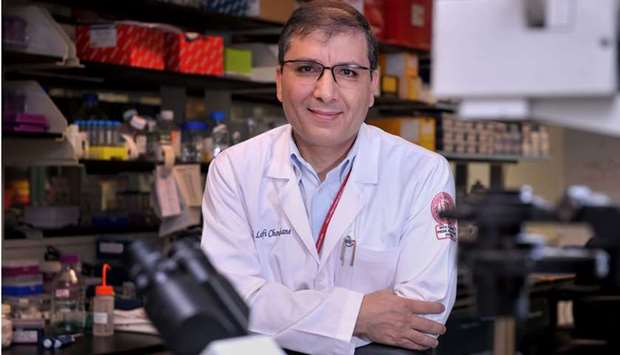Researchers at Weill Cornell Medicine – Qatar (WCM-Q) believe camels could be a source of therapeutic antibodies and potentially a cure, for humans with Covid-19.
Dr Lotfi Chouchane, professor of genetic medicine and professor of microbiology and immunology at WCM-Q, believes that dromedary camels may offer a solution to the problem. This is because camel single-chain antibodies could be produced in large quantities and access viral targets that are hidden for conventional antibodies.
Dr Chouchane explained that there have been three major outbreaks of coronaviruses so far: Sars in 2002, Mers in 2012 and the current Covid-19. The viruses all belong to the same sub-family of coronaviruses and all are believed to have originated in bats before being passed onto an intermediate host and then onto humans. For the Mers virus, the unique intermediary host was the dromedary camel.
He said, “You can find Mers virus antibodies in camels quite easily but rarely do you find an animal suffering with the disease, so it appears that the dromedary’s immune system is able to rapidly overcome the infection.
“Our hypothesis was that given the similarity between the viruses causing Mers and Covid-19, could the Mers virus antibodies produced by camels also be effective against the Covid-19 virus?”
With support from Weill Cornell Medicine-Qatar, Qatar National Research Fund grant, the Ministry of Public Health and the Ministry of Environment and Municipality, samples were taken from a biorepository of camel specimens taken before and after the Covid-19 pandemic emerged, of which all animals had antibodies to the Mers virus.
Working with colleagues from WCM-Q, Sidra Medicine and the Ministry of Public Health, Dr Chouchane found that the dromedaries’ Mers virus antibodies were indeed able to prevent the Covid-19 virus from binding to its target cells.
The next stage was to discover the target of the Covid-19 virus camel antibodies, which was done by sophisticated molecular techniques. This allowed the researchers to understand exactly which section of the viral proteins was responsible for inducing neutralising antibodies and stopping the virus in its tracks. Importantly, because Sars, Mers and Covid-19 viruses are all so similar, this common section could be used as a therapy for all three, along with potential variants and future coronaviruses belonging to the same sub-family.
Dr Chouchane said, “The proposed therapy is to come up with engineered camel antibodies formed by three or four small camel antibodies in one molecule, which each recognise different parts of the virus. The infected subject would then be injected with these antibodies and the combination of three or four would increase the chance of success.”
While transplants of animal tissue to humans have generally failed due to rejection by the immune system, the researchers do not believe there should be an issue with using antibodies from a different species.
Dr Chouchane said, “We are only using the section of the antibody which targets the virus and if you look at the antibodies produced by dromedaries, they are very similar structurally to those produced by humans, so we do not foresee a negative cross-species immunogenic response to the therapy.”
Dr Chouchane stressed that the antibody therapy would not be a replacement for the existing vaccines.
The next task for the researchers, which could take a few months, is for the hypothesis to be proved safe and effective in rodents. If successful, it would go onto the next stage of development, and would probably be undertaken by a multi-national pharmaceutical company.

